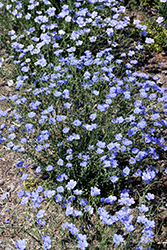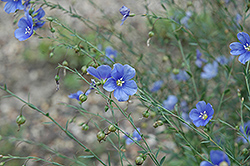>> Home
Sapphire Perennial Flax
Linum perenne 'Sapphire'
Height: 15 inches
Spacing: 8 inches
Sunlight:
![]()
![]()
Hardiness Zone: 2a
Description:
This compact variety produces a mound of ferny green foliage and loads of sky blue flowers for months; an excellent addition to borders, rock gardens or containers; vigorous and low maintenance
Ornamental Features
Sapphire Perennial Flax features airy powder blue flowers at the ends of the stems in mid summer. Its grassy leaves remain dark green in colour throughout the season.
Landscape Attributes
Sapphire Perennial Flax is an open herbaceous perennial with an upright spreading habit of growth. It brings an extremely fine and delicate texture to the garden composition and should be used to full effect.
This plant will require occasional maintenance and upkeep, and should be cut back in late fall in preparation for winter. Deer don't particularly care for this plant and will usually leave it alone in favor of tastier treats. Gardeners should be aware of the following characteristic(s) that may warrant special consideration;
- Self-Seeding
Sapphire Perennial Flax is recommended for the following landscape applications;
- Mass Planting
- General Garden Use
- Naturalizing And Woodland Gardens
Planting & Growing
Sapphire Perennial Flax will grow to be about 12 inches tall at maturity, with a spread of 12 inches. When grown in masses or used as a bedding plant, individual plants should be spaced approximately 8 inches apart. It grows at a fast rate, and under ideal conditions can be expected to live for approximately 3 years. As an herbaceous perennial, this plant will usually die back to the crown each winter, and will regrow from the base each spring. Be careful not to disturb the crown in late winter when it may not be readily seen!
This plant does best in full sun to partial shade. It prefers dry to average moisture levels with very well-drained soil, and will often die in standing water. It is considered to be drought-tolerant, and thus makes an ideal choice for a low-water garden or xeriscape application. It is not particular as to soil type, but has a definite preference for alkaline soils. It is somewhat tolerant of urban pollution. This is a selected variety of a species not originally from North America.

